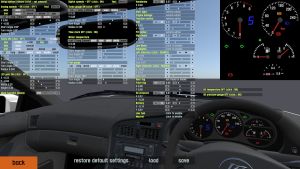Difference between revisions of "LFS Editor/Guides/Dashboard"
From LFS Manual
< LFS Editor | Guides
Jump to navigationJump to searchm |
(custom dashboard backing texture) |
||
| (6 intermediate revisions by the same user not shown) | |||
| Line 1: | Line 1: | ||
{{Under construction}} | {{Under construction}} | ||
| − | {{Infobox | + | {{Infobox LFS Editor}} |
| − | {{See also|Dashboard Editor}} | + | {{See also|LFS Editor/Vehicle Editor/Textures/Dashboard Editor|Dashboard Editor}} |
[[Image:LFS Editor - dashboard editor.jpg|Dashboard editor|thumb]] | [[Image:LFS Editor - dashboard editor.jpg|Dashboard editor|thumb]] | ||
| − | + | You can edit the positions of various parts of the car '''dashboard''' or switch some gauges or [[LFS Editor/Vehicle Editor/Textures/Dashboard Editor#Dashboard lights|lights]] on or off in the [[LFS Editor/Vehicle Editor/Textures/Dashboard Editor|dashboard editor]]. | |
== Choosing the dashboard type == | == Choosing the dashboard type == | ||
| − | + | {{steps | |
| + | | Open the [[Vehicle Editor]]. | ||
| + | | In the top left corner, click the {{old button|Textures|#a1ffa1}} button. | ||
| + | | In the top left corner, click the {{old button|s_clock}} button to select the dashboard type.<p>This strange looking name, e.g. {{kbd|s_clock_formula}} is actually a specially named live texture that you can enter in [[../../Modeller/Texture Page Mode|page mode]] in the [[Modeller]], as a texture page either for the main object or a subobject.</p> | ||
| + | }} | ||
| − | + | == Entering the dashboard editor == | |
| − | + | {{steps | |
| + | | Open the [[Vehicle Editor]]. | ||
| + | | In the top left corner, click the {{old button|Textures|#a1ffa1}} button. | ||
| + | | In the top left corner, click the {{old button|EDIT}} button next to {{old button|CLOCKS}}{{old button|s_clock}}. | ||
| + | }} | ||
| − | + | It is a good idea to switch off any lights or gauges you don't need. | |
| + | |||
| + | == Custom dashboard backing texture == | ||
| + | |||
| + | There is an option to create a custom dashboard backing texture for the clocks. The backing texture appears behind the needle, numbers and markings. It appears illuminated (self lit) like the default dashboards. The recommended texture size is 512 or 1024 for future-proofing. | ||
| − | + | {{steps | |
| + | | Open the [[LFS Editor/Modeller|Modeller]]. | ||
| + | | Make sure you have the main object selected in [[LFS Editor/Modeller/Subobject Mode|subobject mode]]. | ||
| + | | Go to the [[LFS Editor/Modeller/Texture Page Mode|page mode]] by clicking the {{old button|page}} button or pressing {{key press|7}}. | ||
| + | | Click {{old button|add new page|#a1ffa1}} and load the backing texture. | ||
| + | | Click the {{old button|fixed}} button to mark it as "dash". | ||
| + | }} | ||
| − | [[Category:LFS Editor Guides]] | + | [[Category:LFS Editor Guides|{{SUBPAGENAME}}]] |
Revision as of 16:22, 12 February 2024
| This page or section is being initially created, or is in the process of an expansion or major restructuring. You are welcome to assist in its construction by editing it. |
| LFS Editor | |
|---|---|
|
|
| Vehicle Mods |
See also: Dashboard Editor
You can edit the positions of various parts of the car dashboard or switch some gauges or lights on or off in the dashboard editor.
Choosing the dashboard type
- 1 Open the Vehicle Editor.
- 2 In the top left corner, click the Textures button.
- 3 In the top left corner, click the s_clock button to select the dashboard type.
This strange looking name, e.g. s_clock_formula is actually a specially named live texture that you can enter in page mode in the Modeller, as a texture page either for the main object or a subobject.
Entering the dashboard editor
- 1 Open the Vehicle Editor.
- 2 In the top left corner, click the Textures button.
- 3 In the top left corner, click the EDIT button next to CLOCKSs_clock.
It is a good idea to switch off any lights or gauges you don't need.
Custom dashboard backing texture
There is an option to create a custom dashboard backing texture for the clocks. The backing texture appears behind the needle, numbers and markings. It appears illuminated (self lit) like the default dashboards. The recommended texture size is 512 or 1024 for future-proofing.
- 1 Open the Modeller.
- 2 Make sure you have the main object selected in subobject mode.
- 3 Go to the page mode by clicking the page button or pressing 7.
- 4 Click add new page and load the backing texture.
- 5 Click the fixed button to mark it as "dash".
